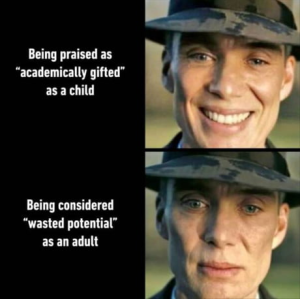Gifted
From Gifted Kid to Wasted Potential: A Tale of Misaligned Systems
The trajectory from "gifted kid" to "wasted potential" is a path that many talented individuals find themselves navigating, not because they lacked ability or ambition, but because the systems they encountered—educational, societal, and professional—failed to harness their potential. MoNoRi-Chan’s story is an archetype of this disillusioning journey, shaped by a mismatch between capability and opportunity.
The Gifted Kid Syndrome
As a student, MoNoRi-Chan thrived in an environment that rewarded curiosity, problem-solving, and competition. His successes at events like the Microsoft Office Specialist Olympics and his knack for out-of-the-box thinking (such as discovering vulnerabilities in his school’s servers at 15) painted him as a prodigy destined for greatness. His achievements inspired his school to establish a Gifted Education Program for Computer Studies, recognizing the need to cultivate such exceptional talent.
But what happens when the spotlight of "giftedness" dims? For many like MoNoRi-Chan, the structured environment of school, with its clear goals and accolades, gives way to an adult world that values conformity over creativity.
The Education System: Cultivating Potential or Creating Prototypes?
The education system is often designed to reward specific types of success—memorization, standardization, and adherence to a curriculum. While gifted education programs can provide an outlet for exceptional students, they also run the risk of producing individuals who excel in isolated, narrow circumstances. These programs rarely teach the skills necessary to navigate an adult world that is far messier and less rewarding of raw talent.
For MoNoRi-Chan, his talents as a programmer and problem-solver were undeniable, but his school didn’t equip him for the ambiguity of real-world challenges. It also didn’t prepare him for workplaces where innovation is often stifled by bureaucracy.
The Workplace: A Wasteland for Creativity
In the workplace, many so-called "generic" roles—data entry, spreadsheet wrangling, or repetitive administrative tasks—fail to engage or utilize the full range of abilities that gifted individuals possess. For MoNoRi-Chan, the reality of working long hours for minimum wage in roles that had little connection to his skills and passions was a stark contrast to the promise of his gifted education.
The corporate world’s preference for specialization over versatility, combined with rigid hierarchies, often leaves gifted individuals feeling underutilized and undervalued. Why innovate or problem-solve when the job description merely requires you to input numbers into a database or generate yet another report?
Wasted Potential or Misallocated Resources?
In MoNoRi-Chan’s case, this disillusionment eventually drove him to forge his own path—developing the MEX School Management System in 2015 and diving into Forex and Cryptocurrency trading. However, not everyone has the resilience or opportunity to redirect their potential into self-driven projects. For many, the transition from gifted kid to adult is marked by a slow erosion of confidence and ambition, replaced by the monotony of roles that fail to challenge or inspire.
The problem isn’t with the individuals themselves, but with systems that fail to adapt to their capabilities. Education systems often lack follow-through, leaving gifted students without guidance once they leave the structured confines of school. Workplaces, meanwhile, prioritize efficiency over innovation, preferring employees who follow instructions rather than challenge norms.
A Call for Change
The story of gifted kids like MoNoRi-Chan should serve as a wake-up call. Talent and potential are renewable resources, but they require environments that nurture growth rather than impose conformity.
- Education systems must focus not only on cultivating talent but also on equipping students to navigate a world that doesn’t automatically reward it. Teaching resilience, adaptability, and practical life skills should be as important as fostering raw ability.
- Workplaces must rethink their approach to talent management. Instead of pigeonholing individuals into generic roles, organizations should create opportunities for employees to innovate and solve problems in ways that align with their unique strengths.
The Anti-Hero of Wasted Potential
In the end, MoNoRi-Chan might see himself as an anti-hero—a symbol of rebellion against systems that stifle creativity and individuality. His story is one of adaptation, resilience, and ultimately, self-reinvention. For every gifted kid who becomes a "wasted potential," there’s also the chance for a second act—one where their talents find a place to thrive, not because of the system, but in spite of it.
The question remains: How many MoNoRi-Chans does society overlook before it begins to question its own systems? Perhaps the greatest waste isn’t the potential itself, but the failure to recognize what could have been.
